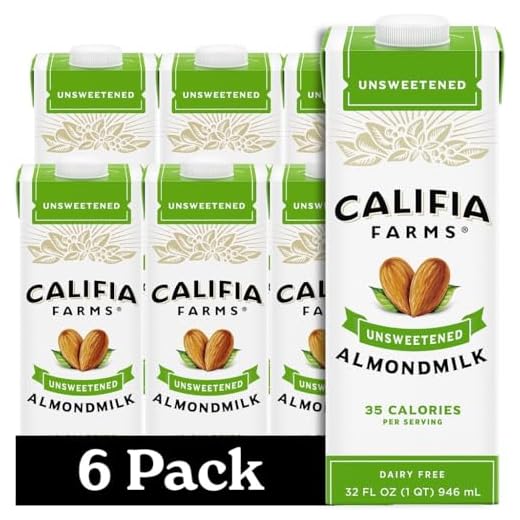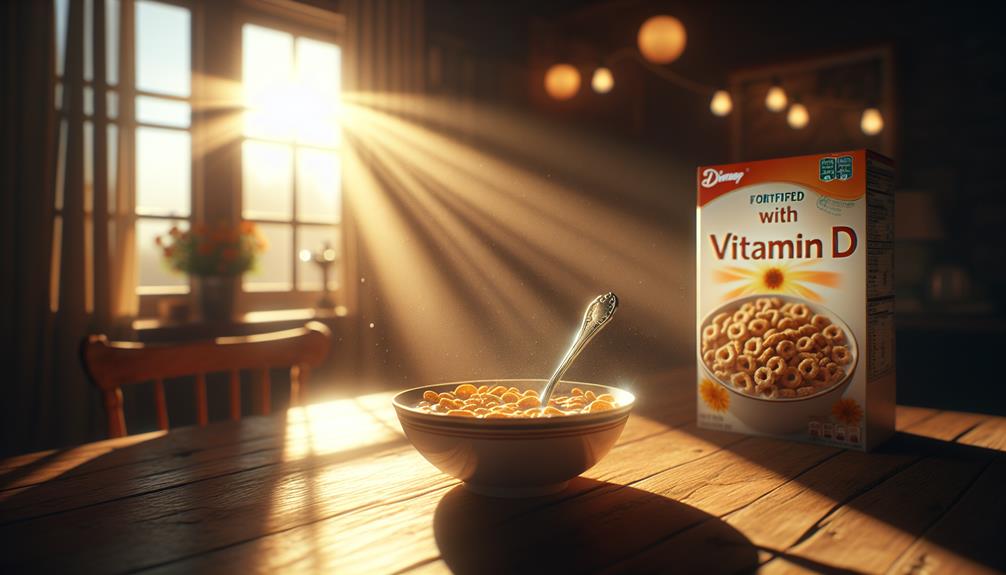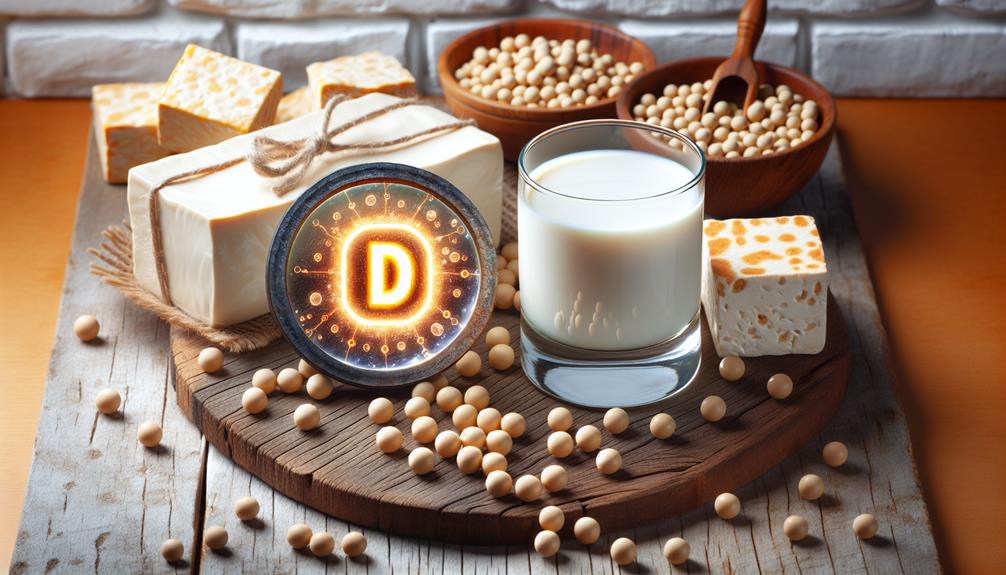







Incorporate fortified plant milks like almond or soy milk for Vitamin D. Sun-exposed mushrooms offer Vitamin D2. Gain Vitamin D from sensible sun exposure. Verify fortification levels in cereals and orange juice. Fortified soy products, like tofu, provide Vitamin D. Consider soy yogurt too. Remember daily Vitamin D3 intake of 600-800 IU. A healthcare provider can guide on personalized supplements. Well-being benefits from Vitamin D include bone health and immune function. Confirm you monitor your levels regularly for holistic health. Strengthen your knowledge on best vitamin D sources for vegans.
Key Takeaways
- Fortified plant milks like almond and soy milk are excellent sources of Vitamin D for vegans.
- Sun-exposed mushrooms provide natural Vitamin D2, essential for bone health and immunity.
- Sunlight exposure triggers Vitamin D synthesis in the body, supporting overall health.
- Fortified soy products such as soy milk and tofu are rich in Vitamin D for vegans.
- Consider Vitamin D supplements for optimal intake; consult healthcare providers for personalized advice.
Fortified Plant Milks
When selecting fortified plant milks as a source of Vitamin D, you can ensure you're supplementing your diet with this essential nutrient. Fortified plant milks, such as soy, almond, or oat milk, are enriched with Vitamin D to help meet your daily requirements. These plant-based alternatives offer various nutritional benefits beyond just Vitamin D. They are often fortified with calcium, vitamin B12, and other essential nutrients, making them a well-rounded choice for vegans.
When considering fortified plant milks, it's important to pay attention to dietary considerations as well. Some fortified plant milks may contain added sugars or other additives, so it's crucial to check the ingredients list before making a purchase. Additionally, not all fortified plant milks provide the same amount of Vitamin D, so comparing labels can help you choose the best option for your needs.
Incorporating fortified plant milks into your diet can be a convenient way to boost your Vitamin D intake while enjoying the various nutritional benefits they offer. Be mindful of the ingredients and choose options that align with your dietary preferences and requirements.
Mushrooms (Exposed to Sunlight)
To further enhance your Vitamin D intake, consider incorporating mushrooms that have been exposed to sunlight into your diet. Mushrooms are unique among plant-based foods as they naturally contain Vitamin D, specifically Vitamin D2. When mushrooms are exposed to sunlight or ultraviolet light during their growth or post-harvest, they produce more Vitamin D2, making them a valuable source of this essential nutrient.
Vitamin D offers numerous benefits to your health, including supporting bone health, enhancing immune function, and aiding in calcium absorption. By including sunlight-exposed mushrooms in your meals, you can boost your Vitamin D levels in a vegan-friendly way.
Mushroom cultivation practices play a vital role in ensuring the Vitamin D content of these fungi. Farmers or producers expose mushrooms to controlled amounts of sunlight, typically UV light, to stimulate the conversion of ergosterol (a compound present in mushrooms) into Vitamin D2. This process enhances the nutritional value of mushrooms and provides a natural source of Vitamin D for those following a vegan diet.
Sunlight Exposure

Exposure to sunlight is an essential factor in the natural production of Vitamin D in the human body. When your skin is exposed to sunlight, it triggers a series of reactions that ultimately lead to the synthesis of Vitamin D. To maximize Vitamin D absorption, it's recommended to expose large areas of your skin, like your arms and legs, to the sun without sunscreen for around 10-30 minutes a few times a week. Sunscreen application can reduce the amount of Vitamin D produced by the skin, so balancing sun exposure with protection from harmful UV rays is key. The best time of day for sun exposure to promote Vitamin D production is midday when the sun is at its peak in the sky. Remember, it's important to practice safe sun habits to prevent skin damage and reduce the risk of skin cancer while still benefiting from the natural Vitamin D synthesis that sunlight provides.
Fortified Orange Juice
Fortified orange juice is a convenient and accessible source of Vitamin D for individuals following a vegan diet. Many brands fortify orange juice with Vitamin D, making it a valuable addition to a plant-based diet. This fortified juice can provide around 100 IU (International Units) of Vitamin D per cup, contributing to the recommended daily intake of this essential nutrient. Aside from Vitamin D, orange juice is also rich in other nutrients like vitamin C, potassium, and antioxidants, offering additional health benefits.
When considering alternative sources of Vitamin D for vegans, fortified orange juice stands out as a practical option, especially for those who may not have access to sunlight or prefer not to rely on supplements. While it may not be as potent a source of Vitamin D as sunlight or supplements, incorporating fortified orange juice into your diet can help boost your overall intake of this essential vitamin. Additionally, it adds variety to your daily sources of nutrients, contributing to a well-rounded vegan diet.
Fortified Cereals

If you're looking to enhance your Vitamin D intake as a vegan, consider exploring fortified cereals as a convenient and essential option in your diet. Fortified cereals are a great source of Vitamin D for vegans, as they are often enriched with this crucial nutrient during the manufacturing process. In addition to Vitamin D, fortified cereals provide a variety of essential vitamins and minerals, making them a nutritious choice for breakfast or a snack.
Nutritional benefits: Fortified cereals are not only a good source of Vitamin D but also contain essential nutrients such as iron, B vitamins, and fiber. These nutrients are important for maintaining overall health and well-being, making fortified cereals a valuable addition to a vegan diet.
Cooking tips: To maximize the nutritional benefits of fortified cereals, pair them with a plant-based milk enriched with Vitamin D, such as almond milk. This combination will further boost your Vitamin D intake and provide a delicious and nutritious meal option. Additionally, consider adding fresh fruits or nuts to your cereal for added flavor and nutrients.
Almond Milk (Fortified)
For individuals following a vegan diet, incorporating fortified almond milk can be a beneficial way to boost your Vitamin D intake. Fortified almond milk is a plant-based alternative that provides essential nutrients, including Vitamin D. When comparing the nutritional benefits, fortified almond milk can offer similar amounts of Vitamin D as cow's milk, making it a suitable option for vegans looking to increase their intake of this vitamin.
In terms of taste comparison, almond milk has a slightly nutty flavor compared to cow's milk, which some individuals may find appealing. However, taste preferences can vary, so it is recommended to try different brands to find one that suits your palate.
When considering homemade versus store-bought options, making almond milk at home allows you to control the ingredients and avoid additives present in some commercial brands. On the other hand, store-bought fortified almond milk is convenient and often fortified with additional vitamins and minerals, including Vitamin D. Ultimately, whether you choose homemade or store-bought almond milk, both can contribute to meeting your Vitamin D needs on a vegan diet.
Soy Products (Fortified)

When selecting sources of Vitamin D on a vegan diet, exploring fortified soy products can be a beneficial option to ponder. Many soy products like soy milk, tofu, and soy yogurt are often enriched with Vitamin D, making them a convenient way for vegans to meet their dietary requirements for this essential nutrient.
Enriched soy products can play an important role in helping vegans maintain ideal Vitamin D levels, especially since this vitamin is mainly found in animal-based foods. By incorporating fortified soy products into your diet, you can guarantee that you are receiving the necessary nutrients to support your overall health and well-being.
In addition to addressing dietary requirements, consuming fortified soy products offers various health benefits. Vitamin D is essential for maintaining strong bones, supporting immune function, and regulating mood. By regularly including enriched soy products in your meals, you can potentially reduce the risk of Vitamin D deficiency and its associated health issues.
Supplements
Exploring the option of incorporating supplements into your vegan diet can provide an additional avenue for guaranteeing adequate Vitamin D intake, complementing the benefits of fortified soy products. When opting for Vitamin D supplements, it is crucial to take into account the daily dose that meets your requirements. The recommended daily intake for most adults is around 600-800 IU (International Units), but this can vary based on factors like age, sun exposure, and overall health.
Vitamin D supplements come in two main forms: D2 (ergocalciferol) and D3 (cholecalciferol). While both can effectively raise Vitamin D levels, D3 is believed to be more potent due to its higher absorption rate. Studies suggest that Vitamin D3 is more effective at increasing and maintaining Vitamin D levels in the body over time.
When selecting a supplement, ensure it contains the appropriate dosage of Vitamin D and contemplate opting for Vitamin D3 for potentially better absorption. Consulting with a healthcare provider can help determine the most suitable supplement and dosage for your individual needs.





